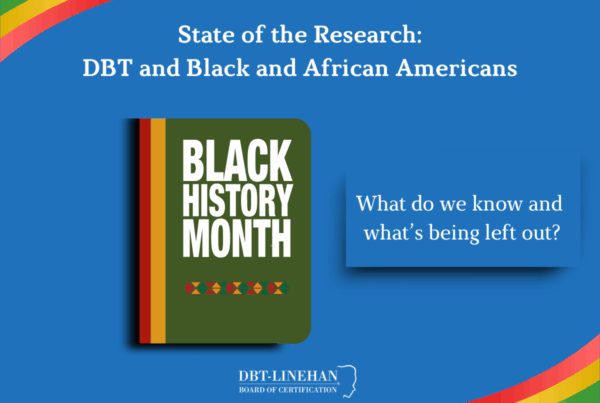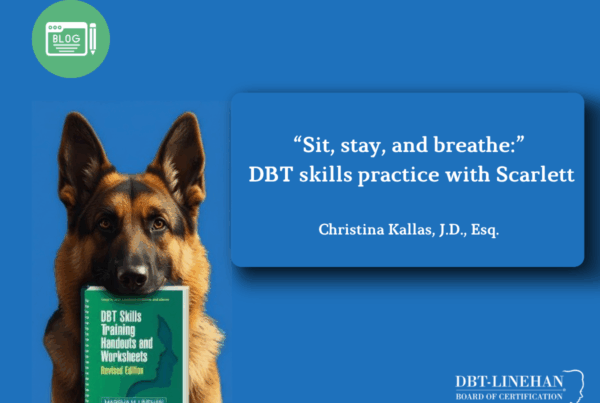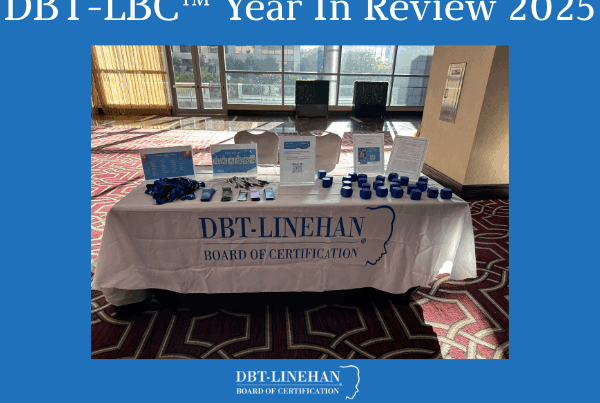Please join us in spotlighting the DBT-LBC™ Certified Program at Broadleaf Health in Ontario, Canada! One of three DBT-LBC™ certified programs in Canada, Broadleaf Health was founded by Andrew Ekblad, Ph.D., C. Psych. With over 20 years of clinical and research experience related to Dialectical Behavior Therapy (DBT), Dr. Ekblad also has extensive experience in the application of Cognitive Behavior Therapy (CBT), Mindfulness Based Therapies (MBT), and evidence-based treatment (Prolonged Exposure) for post-traumatic stress. He is a Certified Clinician with the Dialectical Behavior Therapy Linehan Board of Certification (DBT-LBC™). Registered with the College of Psychologists of Ontario and the Newfoundland and Labrador Psychology Board, Dr Ekblad is an Adjunct Professor of Psychiatry at McMaster University. Dr. Ekblad received his Ph.D. in clinical psychology from Duke University and completed his pre-doctoral internship at the Centre for Addiction and Mental Health in Toronto.
Dr. Ekblad explains why he and his team at Broadleaf Health, established in 2009, places a strong value on DBT-LBC™ Certification. “When I started offering DBT in Ontario in 2008 under the supervision of the wonderful Dr. Shelley McMain, there were relatively few DBT programs in the province. Clinicians generally had a sense that it was problematic to call ‘DBT-informed’ treatment ‘DBT’, so they were mindful and conscientious about that. Perhaps because clinicians had a clearer understanding of what the intervention was and was not, clients did as well.”
“That landscape has shifted in the last 15 years. It is extremely encouraging to see the dissemination of DBT. I have no doubt that the growing number of DBT programs and in many cases DBT-informed programs reduce the suffering of many (and that’s what we are all in this for!) I also want to be clear that I believe there always have been excellent and effective DBT-informed programs. There always have been and always will be excellent non-certified programs. I have worked with clinicians in prisons, emergency rooms, and amongst the unhoused as well as those who work in other settings with the highly marginalized. The word angel comes to mind when I think of some of these clinicians. I have been honoured to share space, consult with, teach, and learn alongside clinicians in non-traditional settings, or in settings where, for whatever reason, adherence and certification are not deemed as options. At the same time, I have noticed that it is increasingly common for people with what I consider a very modest level of training to say they are offering DBT, or to see DBT-informed programs say they are providing DBT.”
Dr Ekblad shared the impact of varied treatment delivery on clinicians consulting with Broadleaf Health, as well as incoming clinic clients. “We increasingly found ourselves consulting with clinicians who, for example, said they were ‘doing DBT’ and that they were generally opposed to behavioural principles, or that they were ‘doing DBT’ and at the same time did not ask clients to do homework because the idea of it was not compassionate, or they did not assess suicidal and self-harming behaviour.” Dr. Ekblad shared shifts in client feedback as well. “My team and I started noticing more and more clients coming in saying that they did not want to do DBT, because they’d ‘already done it’. We found that some programs in some cases led clients to think that DBT was an intervention that only validated the client, or that skills were sometimes discussed and at the same time not regarded as central to building a life worth living. These misunderstandings led to lowered treatment engagement and, in some cases, even offence at any emphasis on basic DBT treatment components like diary cards or skills homework. In short, we increasingly found that alongside the wonderful increases in access to DBT and some effective DBT-informed care that come with treatment dissemination, there was a simultaneous loss of understanding of the intervention.”
Dr. Ekblad defined certification as an evaluative tool. “In traditional outpatient settings where it is possible to provide adherent and comprehensive DBT, the DBT- LBC™ designation is a quality check on the kind of DBT that a clinic is providing. While verification of quality is a common process in environments as varied as car production, pharmaceutical production, and restaurants, quality checks on therapy are surprisingly rare.”
“While there are several ‘Certifying Bodies’ for DBT, the standards for these certifying bodies vary widely. Only one certifying body was developed with the involvement of and endorsed by the treatment developer, Dr. Marsha Linehan. This is the DBT-Linehan Board of Certification. We feel a responsibility to align ourselves with the person who created, researched, standardized, and disseminated the thing that we say we are doing. This feels even more important in the increasingly noisy airwaves of information that clients receive about what effective psychotherapy is and is not.”
Attending to team cohesion means sharing time and meals with each other. “We have lunch together every week. It is right before Consultation Team, and so people attend both. While we sometimes have ‘work talk’ during lunch, and might have a student present on their research, we generally try to keep the conversation light and unstructured. When we found that too much work talk was seeping into lunch, we created a separate ‘business meeting’ during the week just so we can continue to have this ‘together down-time’ during the week at our Thursday lunches to relax as a group. We also do an annual overnight retreat that is a balance of work time and hang out time, which has been a great team/ morale building experience for us for the last few years.”
Dr. Ekblad also shares his efforts to remain engaged in the hard work of DBT.
“In the last few years, I’ve been forced to rethink my opinions of online work, hybrid work, adolescent and family programming, and the way we train and supervise clinicians who are new to DBT. Maintaining flexibility is an essential and challenging skill for those who also place a strong emphasis on fidelity to the model. I recommend being mindful, creative, and nimble when trying to find the shifting balance between fidelity and flexibility.”
Dr. Ekblad offered a final valuable tip for DBT team members. “Also, get a dog.”
Congratulations to you and your team at Broadleaf Health for your DBT-LBC™ Programs Certification! Thank you for Broadleaf’s dedication to providing DBT treatment as it was designed to be delivered.





